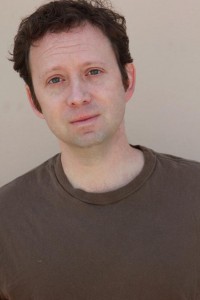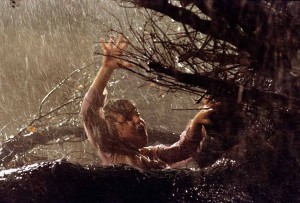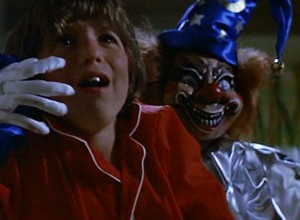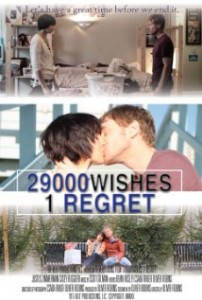 Oliver Robins is known best for his work in the classic horror film “Poltergeist”. He has also worked on films like “Airplane II: The Sequel”. Currently Oliver is focusing on writing and directing with his latest film, “29,000 Wishes, 1 Regret”. Oliver took out some time to chat about his experience on “Poltergeist” and working with Steven Spielberg.
Oliver Robins is known best for his work in the classic horror film “Poltergeist”. He has also worked on films like “Airplane II: The Sequel”. Currently Oliver is focusing on writing and directing with his latest film, “29,000 Wishes, 1 Regret”. Oliver took out some time to chat about his experience on “Poltergeist” and working with Steven Spielberg.
Mike Gencarelli: Were you aware of how physical the role in “Poltergeist” was going to be?
Oliver Robins: For the most part I did because in the script it really explained what was going to happen. In terms of how they were going to execute those scenes I had no idea. It was presented to me like I was going to camp. And that’s exactly how it was. I had a great time. Every time I went to the set I had a new adventure. Because when you’re a kid you pretty much accept everything. They’d say, “OK, Oliver, today you’re going to be bolted to this wall and hung up by wires. We’re going to turn the room around and you’re going to scream into the camera because at the angle you’re hanging at it’s going to look like you’re flying.” And as a kid you’re thinking, “OK, that sounds fun.” Then the next day they tell you you’re going to be back in the room and giant tree arms are going to come at you. They want you to jump on the tree arms while screaming at it. Then they throw sugar glass at your face but they do remind you to cover your face when they’re doing it. And as a kid you’re having a great time. It’s like “what’s next?” As an adult you might step back and think it’s kind of crazy. But I used to love climbing trees so it was a blast to me.
MG: So it was really more like fun then work?
OR: Oh yeah, I had a great time. And it was a great bunch of people. Steven Spielberg. Kathleen Kennedy. Frank Marshall…they were a great group of people to work with. I didn’t want to leave the set when we were done every day. I had to because of the labor laws. “Sorry Oliver, you have to go home.”
MG: There has always been a lot of speculation as to whether Spielberg or Tobe Hooper was the director in charge. Can you lend any insight into this?
OR: I’ve learned that people seem to like controversy in pretty much everything in life. And this is one that will never go away no matter what people say. You can say that Steven Spielberg did NOT direct the film, bottom line, but people don’t want to believe it. They want to be conspiracy theorists because the falsehood is more exciting in many ways then the  truth. As for Spielberg, he wrote the script (NOTE: the Original story for “Poltergeist” came from Steven Spielberg, who shared screenplay credit with Michael Grais and Mark Victor)…he was the producer. And he had a vision that he shared with Tobe. But Tobe directed me. I mean, it was investigated by the DGA (Director’s Guild of America) at the time. But when it comes to the nitty gritty, Tobe told me where to stand. He told the camera operator where to put the camera. All of the rules that I learned in film school about what a director does Tobe did. As far as what happened behind the scenes, I’m sure Steven explained what he was going for. I mean, when you’re the writer and the producer, you do what any writer would want to do. Explain your vision and your intent. Hope that they are executed as a team. And I think they worked as a great team. So in terms of what I saw on set, Tobe was the director. At least that’s my perspective on it. (NOTE: When “Poltergeist” opened in June 1982 these rumors were already circulating. Tobe Hooper has maintained that these rumors cost him an Oscar nomination for Best Director. Ironically, a week later “E.T.” opened. That film earned Spielberg a Best Director nod).
truth. As for Spielberg, he wrote the script (NOTE: the Original story for “Poltergeist” came from Steven Spielberg, who shared screenplay credit with Michael Grais and Mark Victor)…he was the producer. And he had a vision that he shared with Tobe. But Tobe directed me. I mean, it was investigated by the DGA (Director’s Guild of America) at the time. But when it comes to the nitty gritty, Tobe told me where to stand. He told the camera operator where to put the camera. All of the rules that I learned in film school about what a director does Tobe did. As far as what happened behind the scenes, I’m sure Steven explained what he was going for. I mean, when you’re the writer and the producer, you do what any writer would want to do. Explain your vision and your intent. Hope that they are executed as a team. And I think they worked as a great team. So in terms of what I saw on set, Tobe was the director. At least that’s my perspective on it. (NOTE: When “Poltergeist” opened in June 1982 these rumors were already circulating. Tobe Hooper has maintained that these rumors cost him an Oscar nomination for Best Director. Ironically, a week later “E.T.” opened. That film earned Spielberg a Best Director nod).
MG: How was the change going from scary “Poltergiest” to the zany “Airplane 2?”
OR: I had seen the original “Airplane,” so I knew the tone of the piece. I loved “Airplane” so I knew what kind of performance they were going for. It was a dream job for me when they gave it to me. Ken Finkleman, the director, was very patient. He told me what he wanted…the very broad and over the top reactions. I had a lot of fun doing it. And the adult actors were basically doing the exact same thing so I just followed their lead.
 MG: What is it like for you now to watch films you made back when you were a kid?
MG: What is it like for you now to watch films you made back when you were a kid?
OR: I just recently looked at “Poltergeist” again. Obviously I’m a bit prejudiced but I think it’s a fantastic movie. As good as the films being made today without any of the great technology that exists now. I think that with the advent of all of the new CGI technology we’re almost losing some of our filmmaking capabilities and techniques. It’s as if CGI is now almost a crutch. I mean in “Alien” you hardly see the “Alien” whereas now they show everything when maybe you don’t need to show everything. Not to mention that with a lot of CGI effects today it’s almost hard to suspend disbelief. Getting back to “Poltergeist,” that film is so scary because of the stuff you never even saw. It’s in your head because you really don’t know what you’re looking at. It’s all in your mind. And I think that’s brilliant filmmaking. And it’s not just a horror film. A professor told me that compassion will always win over camera. Which means you make a film with story and character and relationships and the special effects are secondary. And that’s true about “Poltergeist.” Sure it’s scary but it’s the family and their relationships that you care about during the movie.
MG: Now you’re focusing on writing and directing. Talk about taking that path in your career.
OR: It was on “Poltergeist” that I decided I wanted to be a filmmaker. Steven Spielberg loaned me a Super 8 camera and at 10 years old I started making films. And it became a passion that I fell in love with. I fell in love with telling stories. I made a 15 minute film called “The Crystal” that won first prize at a French Film Festival. I realized I wanted to do this as a career. So on the advice of Mr. Spielberg I went to the USC Film School (NOTE: Besides Steven Spielberg, note USC Film School Alumni include George Lucas, Robert Zemeckis and Ron Howard), graduated and I’ve been pursuing filmmaking pretty much ever since. I love all genre’s of film. From comedies to romantic comedies to dramas and family dramas. Hopefully I’ll be able to tell many stories.
MG: You wear pretty much every hat possible on your new film “29,000 Wishes, 1 Regret.” What was the inspiration behind the film?
OR: My inspiration was that I wanted to do a film about our times right now. And I learned it was going to be difficult to raise funding for a film about a young couple who loses everything because of the recession and realize they’re never going to live the life they hoped for. So they decide to charge what’s left on their credit cards and then kill themselves. That story line proved next to impossible to raise money through the traditional means. And I didn’t want to wait ten years to make this movie. I thought it was timely and that it had to be done right now. We had the technology to do it. We had the cameras. So we went out and did it. I’ve been to film school and I said to myself, “Let’s go out and let me see if I can fill every behind the scene role on the movie.” I brought in a couple of friends to assist, one to be DP and one to run sound. But sometimes they weren’t available so I’d have to do everything myself. But what I loved about it is that it allowed me to work very close with the actors and allowed me to really just focus on their performances. I didn’t have to worry about funding or paying back money. It was really just our time that we were spending. And we could really just tell the story that we wanted to tell. Of course the downside is that we didn’t have an infrastructure. We were kind of scattered trying to assemble everything while shooting this film basically by the seat of our pants. So there was an upside and also a darker side to this level of filmmaking. But I think it really tested my ability. To be able to make a film with pretty much nothing…just me and my camera. For all intensive purposes the only thing I really had going was my knowledge of cinema from film school. It’s the same equipment. Now a high school kid can get the equipment as a holiday gift and go out and do the same thing without a lot of money.
was going to be difficult to raise funding for a film about a young couple who loses everything because of the recession and realize they’re never going to live the life they hoped for. So they decide to charge what’s left on their credit cards and then kill themselves. That story line proved next to impossible to raise money through the traditional means. And I didn’t want to wait ten years to make this movie. I thought it was timely and that it had to be done right now. We had the technology to do it. We had the cameras. So we went out and did it. I’ve been to film school and I said to myself, “Let’s go out and let me see if I can fill every behind the scene role on the movie.” I brought in a couple of friends to assist, one to be DP and one to run sound. But sometimes they weren’t available so I’d have to do everything myself. But what I loved about it is that it allowed me to work very close with the actors and allowed me to really just focus on their performances. I didn’t have to worry about funding or paying back money. It was really just our time that we were spending. And we could really just tell the story that we wanted to tell. Of course the downside is that we didn’t have an infrastructure. We were kind of scattered trying to assemble everything while shooting this film basically by the seat of our pants. So there was an upside and also a darker side to this level of filmmaking. But I think it really tested my ability. To be able to make a film with pretty much nothing…just me and my camera. For all intensive purposes the only thing I really had going was my knowledge of cinema from film school. It’s the same equipment. Now a high school kid can get the equipment as a holiday gift and go out and do the same thing without a lot of money.
MG: Where can people see the film?
OR: They can buy it right now on Amazon, (https://www.createspace.com/334235) or they can download it as well on Amazon. Just type “29000 Wishes, 1 Regret” on Amazon and they can watch it at a moment’s notice. The film has a distributor and it should be available on network television later this year.
MG: Tell us why you started your own clothing line, Cursed Clothes?
OR: I had been going to different horror conventions and thought that it would be great to give fans a little bit more of the movie I was in. So I got with a designer to create “Poltergeist” – inspired T-shirts to hand out. And we had so much fun creating these T-shirts that I thought it would be fantastic to do with other films…all of my favorite films from the 70s, 80s and 90s. Even movies from now. So we created an entire line of horror inspired clothing. And that’s how we came up with Cursed Clothes, (www.cursedclothes.com). We’re creating designs for all of the films that I love. “


I told you when I first heard this – this is one of the best interviews you’ve done. Great job – especially the whole Tobe’ Hooper vs Steven Spielberg directorship question. Outstanding!